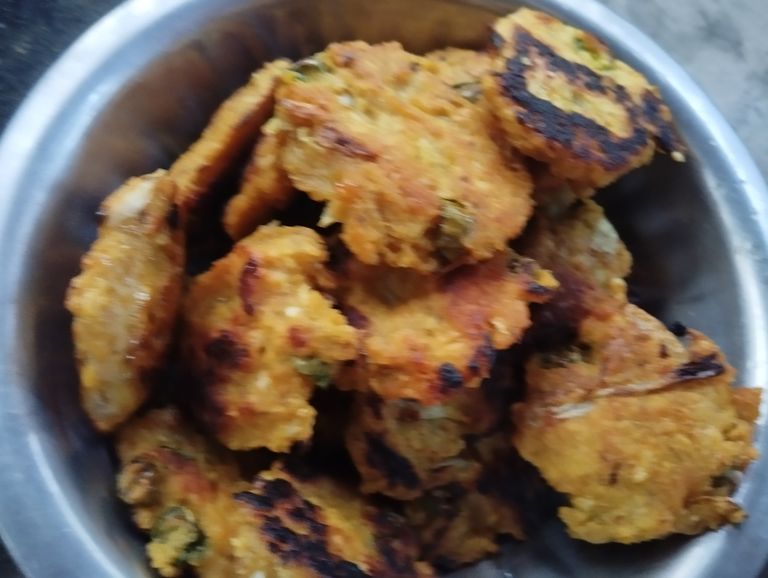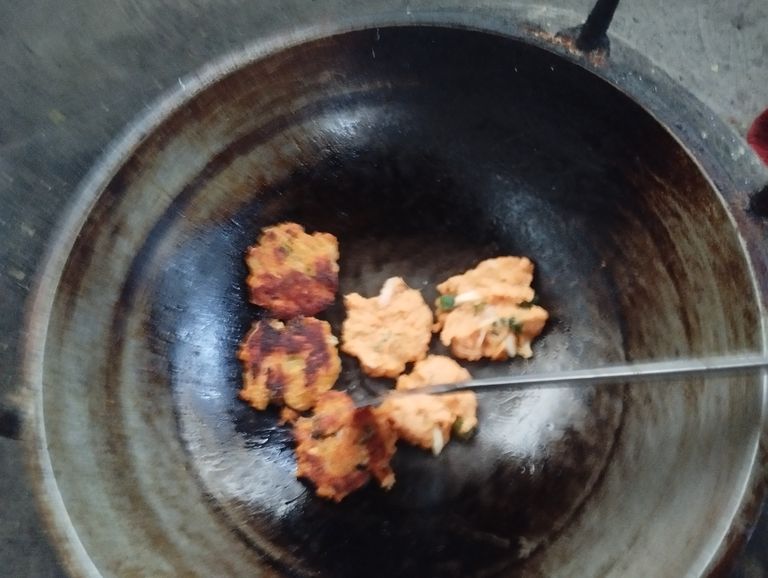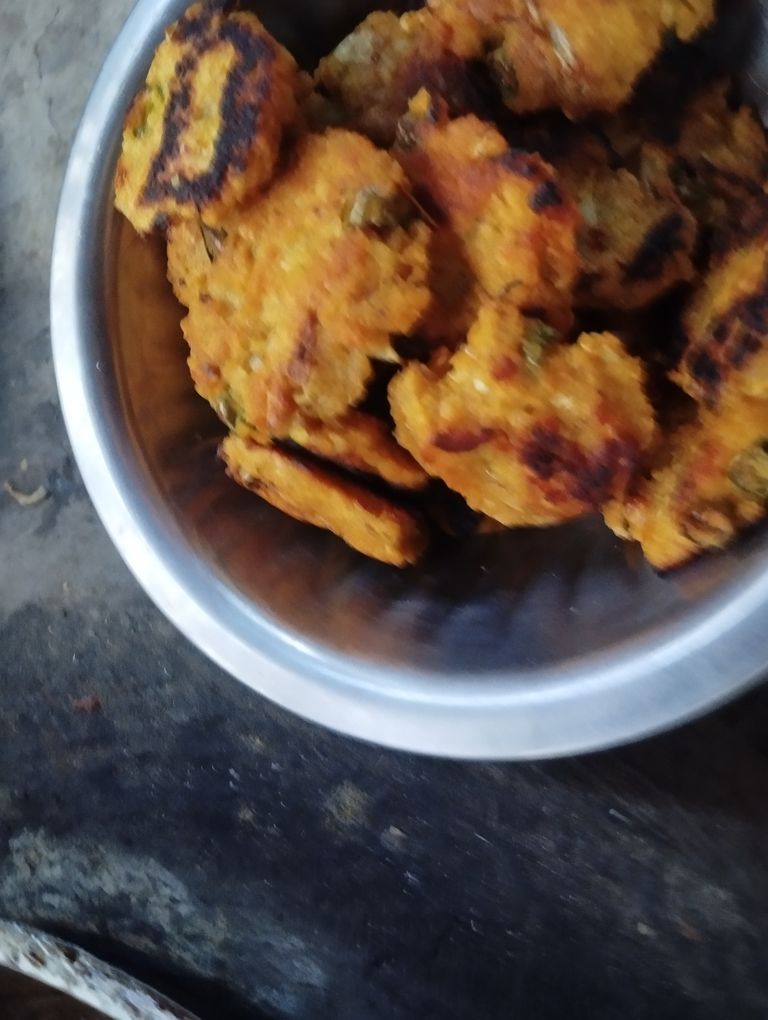How to Make Perfect Dal Bora Lentil Fritters.

Dal Bora, also known as lentil fritters, is a popular crispy snack in Bengali cuisine. These deep-fried fritters are made from soaked lentils, spices, and herbs, making them a delicious and protein-rich treat. Whether enjoyed with tea or as a side dish with rice and dal, Dal Bora is a favorite among many. In this blog, we will guide you through the step-by-step process of making crispy and flavorful Dal Bora at home.
Ingredients for Dal Bora
To make Dal Bora, you will need the following ingredients:
Main Ingredients:
1 cup lentils (moong dal, masoor dal, or chana dal)
2-3 green chilies (finely chopped)
1 medium onion (finely chopped)
1 teaspoon ginger (grated or finely chopped)
1 teaspoon cumin seeds or cumin powder
½ teaspoon turmeric powder
½ teaspoon red chili powder (optional)
Salt to taste
Fresh coriander leaves (chopped)
Oil for deep frying
Optional Ingredients:
½ teaspoon baking soda (for extra fluffiness)
1 teaspoon rice flour (for extra crispiness)
Step-by-Step Recipe for Dal Bora
Step 1: Soaking the Lentils
Wash the lentils thoroughly under running water.
Soak them in enough water for at least 4-6 hours or overnight. This helps soften the lentils and makes them easier to grind.
Step 2: Grinding the Lentils
Drain the soaked lentils and transfer them to a blender.
Add a little water (about 2-3 tablespoons) and grind into a thick, smooth paste. The batter should be thick enough to hold its shape when dropped from a spoon.
If the batter is too watery, you can add a little bit of rice flour to adjust the consistency.
Step 3: Preparing the Mixture
Transfer the ground dal paste into a mixing bowl.
Add chopped onions, green chilies, ginger, cumin seeds, turmeric powder, chili powder, and salt.
Mix everything well using your hands or a spoon.
If using baking soda, add it now and mix well.
Step 4: Frying the Dal Bora
Heating the Oil
Pour enough oil into a deep pan or wok for frying.
Heat the oil over medium heat until it reaches the right temperature. To check, drop a small portion of batter into the oil. If it rises to the surface immediately, the oil is ready.
Frying the Fritters
Wet your fingers slightly and take a small portion of the batter.
Gently drop it into the hot oil, shaping it into a small round or oval fritter.
Fry in batches without overcrowding the pan.
Cook on medium heat until the fritters turn golden brown and crispy.
Use a slotted spoon to remove them and place them on a paper towel to absorb excess oil.
Serving Suggestions
Dal Bora is best served hot and crispy. Here are some ways to enjoy it:
As a tea-time snack with chutney or tomato sauce.
With steamed rice and dal for a traditional Bengali meal.
As a side dish with yogurt or salads for a healthy twist.
Tips for Making the Best Dal Bora
Soak the lentils properly – This ensures easy grinding and better texture.
Avoid adding too much water – A thick batter helps maintain the shape while frying.
Use medium heat for frying – Too high heat will burn the outside while leaving the inside raw.
For extra crispiness, add a little rice flour or semolina to the batter.
If the fritters feel dense, add a pinch of baking soda for fluffier results.
Conclusion
Dal Bora is a simple yet delicious snack that can be made with minimal ingredients. Whether you are craving something crispy to go with your evening tea or need a quick side dish for lunch, these lentil fritters are a great option. Try this recipe at home and enjoy the crispy, golden goodness of homemade Dal Bora! Let us know in the comments how your Dal Bora turned out and if you have any special variations of your own! Happy cooking.
Health Benefits of Eating Fried Lentil Fritters (Daler Bora)
Lentil fritters, popularly known as Daler Bora in Bengali cuisine, are a delicious and crispy snack made from lentil batter and spices. These fritters are deep-fried and enjoyed as a side dish, snack, or even as part of a main meal. While many people associate fried foods with unhealthy eating, Daler Bora, when prepared and consumed in moderation, offers several health benefits. Let’s explore the nutritional value and health benefits of eating fried lentil fritters.
Nutritional Value of Daler Bora
Lentil fritters are primarily made from different types of lentils, such as masoor dal (red lentils), moong dal (yellow lentils), or chana dal (Bengal gram). Lentils are packed with essential nutrients, including:
Proteins – Essential for muscle growth and repair
Dietary Fiber – Aids digestion and promotes gut health
Iron – Helps in red blood cell production and prevents anemia
Magnesium & Potassium – Regulates blood pressure and heart health
Antioxidants – Strengthens the immune system
Healthy Carbohydrates – Provides energy
Health Benefits of Eating Daler Bora
Rich Source of Plant-Based Protein
Lentils are an excellent source of plant-based protein, making Daler Bora a great option for vegetarians and vegans. Protein is crucial for muscle growth, tissue repair, and overall body function. Including lentil fritters in your diet can help meet daily protein requirements, especially for those who do not consume animal proteins.
Aids Digestion and Improves Gut Health
Lentils are high in dietary fiber, which promotes healthy digestion and prevents constipation. Fiber helps in maintaining a healthy gut microbiome and supports smooth bowel movements. Even though Daler Bora is fried, the fiber content from the lentils can still provide some digestive benefits.
Provides Instant Energy
Fried lentil fritters are rich in carbohydrates, making them a quick source of energy. If you feel low on energy or need a snack to keep you going, a few pieces of Daler Bora can provide an instant energy boost.
Supports Heart Health
Lentils contain magnesium and potassium, which help regulate blood pressure and improve cardiovascular health. While deep frying adds some extra fat, using healthier cooking oils like mustard oil, sunflower oil, or olive oil can make Daler Bora a heart-friendly snack when eaten in moderation.
Helps in Managing Blood Sugar Levels
Despite being deep-fried, lentil fritters have a low glycemic index due to their fiber and protein content. This means they can help stabilize blood sugar levels and prevent sudden spikes, making them a better snack option than refined flour-based fried foods.
Boosts Immunity
Lentils are rich in antioxidants, vitamins, and minerals like zinc, iron, and folate, all of which play a crucial role in boosting the immune system. Eating Daler Bora occasionally can provide some essential nutrients that support overall health.

Prevents Anemia
Iron deficiency can lead to anemia, causing fatigue and weakness. Since lentils are an excellent source of iron, consuming Daler Bora can help increase iron levels in the body, reducing the risk of anemia. To enhance iron absorption, pair these fritters with a vitamin C-rich side dish, such as a fresh salad or lemon juice.
Supports Bone Health
Lentils contain calcium, phosphorus, and magnesium, which are essential for maintaining strong bones and preventing bone-related issues like osteoporosis. Including Daler Bora in your diet can contribute to better bone health over time.
Enhances Mood and Reduces Stress
Lentils are a good source of folate, which plays a vital role in producing serotonin, a neurotransmitter that helps regulate mood and reduce stress. Eating foods rich in folate, such as Daler Bora, can contribute to mental well-being.
Versatile and Customizable for a Healthy Diet
One of the best things about Daler Bora is that it can be modified for a healthier version. Instead of deep-frying, you can air-fry or shallow-fry them using minimal oil. Adding vegetables like spinach, carrots, onions, and herbs can further enhance their nutritional value.
How to Make a Healthier Version of Daler Bora
If you want to enjoy the taste of Daler Bora without consuming excess oil, here are some healthier cooking tips:
Use an air fryer or bake them in the oven instead of deep-frying.
Choose healthier oils like olive oil or mustard oil instead of refined vegetable oils.
Incorporate vegetables and spices like garlic, ginger, cumin, and coriander to boost the nutritional profile.
Use whole lentils instead of split ones for added fiber and nutrients.
Conclusion
While deep-fried foods should always be consumed in moderation, Daler Bora offers several health benefits due to its nutrient-rich lentil base. It is a great source of protein, fiber, and essential vitamins, making it a nutritious addition to your diet when prepared with the right ingredients and cooking methods. Whether eaten as a snack, side dish, or paired with rice and dal, these crispy fritters provide both taste and health benefits. So, the next time you crave a crunchy snack, consider making a healthier version of Daler Bora and enjoy its delicious flavors while reaping its nutritional benefits.
Health Benefits of Eating Lentils (Dal)
Lentils, commonly known as dal in South Asia, are an essential part of a balanced diet due to their rich nutritional profile. They are a great source of plant-based protein, fiber, and essential vitamins and minerals. Regular consumption of lentils can provide numerous health benefits, including improving digestion, boosting heart health, managing weight, and controlling blood sugar levels. In this blog, we will explore the many benefits of eating dal and why you should include it in your daily diet.
Rich Source of Plant-Based Protein
Lentils are one of the best plant-based protein sources, making them an excellent choice for vegetarians and vegans. Protein is essential for muscle growth, tissue repair, and overall body function. A single cup of cooked lentils provides about 18 grams of protein, which can help meet daily protein requirements without consuming meat or dairy products.
High in Dietary Fiber
Lentils are packed with both soluble and insoluble fiber. Fiber aids digestion, prevents constipation, and promotes a healthy gut microbiome. Soluble fiber helps lower cholesterol levels, while insoluble fiber supports regular bowel movements. Eating fiber-rich foods like dal can improve gut health and reduce the risk of digestive disorders such as irritable bowel syndrome (IBS).
Supports Heart Health
Regular consumption of dal is beneficial for heart health. Lentils contain high amounts of folate, magnesium, and potassium, which help regulate blood pressure and prevent cardiovascular diseases. The fiber in lentils helps lower LDL (bad) cholesterol levels, reducing the risk of heart attacks and strokes.
Helps Control Blood Sugar Levels
Dal has a low glycemic index (GI), which means it does not cause sudden spikes in blood sugar levels. This makes lentils an excellent food choice for people with diabetes or those at risk of developing diabetes. The fiber in dal slows down the absorption of sugar in the bloodstream, helping maintain stable glucose levels.
Aids in Weight Management
If you are trying to lose or maintain weight, lentils can be a great addition to your diet. They are low in calories but high in protein and fiber, which promote a feeling of fullness and reduce hunger cravings. This helps in managing portion sizes and prevents overeating.
Boosts Energy Levels
Lentils are a rich source of iron, an essential mineral that helps produce hemoglobin in the blood. Hemoglobin is responsible for carrying oxygen throughout the body. A diet that includes iron-rich foods like dal can prevent anemia and boost overall energy levels, keeping fatigue and weakness at bay.
Strengthens the Immune System
Dal contains essential vitamins and minerals such as zinc, vitamin B6, and folate, which play a crucial role in strengthening the immune system. These nutrients help the body fight infections and diseases, keeping you healthy and active.
Good for Bone Health
Lentils are rich in calcium, phosphorus, and magnesium, which are essential for maintaining strong and healthy bones. Including dal in your diet can help prevent osteoporosis and other bone-related issues, especially as you age.
Promotes Healthy Skin and Hair
The protein, vitamins, and minerals found in lentils contribute to healthy skin and hair. The antioxidants in dal help fight free radicals, which can cause premature aging and skin damage. Lentils also contain biotin, a B vitamin that promotes hair growth and reduces hair fall.
Environmentally Friendly and Sustainable
Lentils are a sustainable food source with a low carbon footprint. They require less water and resources to grow compared to animal-based protein sources. Choosing plant-based proteins like dal can help reduce environmental impact while maintaining a healthy diet.
How to Include Lentils in Your Diet
Lentils are versatile and can be cooked in many ways. Here are some delicious ways to include them in your daily meals:
Dal Soup: A warm, comforting bowl of lentil soup is nutritious and easy to prepare.
Dal Curry: Cooked with spices and vegetables, dal curry pairs well with rice or chapati.
Lentil Salad: Boiled lentils mixed with fresh vegetables, lemon juice, and olive oil make a healthy salad.
Lentil Patties: Mashed lentils mixed with spices can be shaped into patties and pan-fried for a protein-rich snack.
Dal Paratha: Lentil-stuffed flatbreads are a delicious way to enjoy dal in breakfast.
Conclusion
Lentils (dal) are a powerhouse of nutrition, offering numerous health benefits. They support heart health, improve digestion, aid in weight management, regulate blood sugar levels, and boost energy. Including dal in your daily diet is a simple and effective way to maintain overall health while enjoying a delicious and versatile food. Whether you prefer it as a soup, curry, or salad, lentils are a must-have for a balanced and healthy lifestyle. Start adding dal to your diet today and enjoy its amazing health benefits.
Health Benefits of Eating Lentils (Dal)
Lentils, commonly known as dal in South Asia, are an essential part of a balanced diet due to their rich nutritional profile. They are a great source of plant-based protein, fiber, and essential vitamins and minerals. Regular consumption of lentils can provide numerous health benefits, including improving digestion, boosting heart health, managing weight, and controlling blood sugar levels. In this blog, we will explore the many benefits of eating dal and why you should include it in your daily diet.
Rich Source of Plant-Based Protein
Lentils are one of the best plant-based protein sources, making them an excellent choice for vegetarians and vegans. Protein is essential for muscle growth, tissue repair, and overall body function. A single cup of cooked lentils provides about 18 grams of protein, which can help meet daily protein requirements without consuming meat or dairy products.
High in Dietary Fiber
Lentils are packed with both soluble and insoluble fiber. Fiber aids digestion, prevents constipation, and promotes a healthy gut microbiome. Soluble fiber helps lower cholesterol levels, while insoluble fiber supports regular bowel movements. Eating fiber-rich foods like dal can improve gut health and reduce the risk of digestive disorders such as irritable bowel syndrome (IBS).
Supports Heart Health
Regular consumption of dal is beneficial for heart health. Lentils contain high amounts of folate, magnesium, and potassium, which help regulate blood pressure and prevent cardiovascular diseases. The fiber in lentils helps lower LDL (bad) cholesterol levels, reducing the risk of heart attacks and strokes.
Helps Control Blood Sugar Levels
Dal has a low glycemic index (GI), which means it does not cause sudden spikes in blood sugar levels. This makes lentils an excellent food choice for people with diabetes or those at risk of developing diabetes. The fiber in dal slows down the absorption of sugar in the bloodstream, helping maintain stable glucose levels.
Aids in Weight Management
If you are trying to lose or maintain weight, lentils can be a great addition to your diet. They are low in calories but high in protein and fiber, which promote a feeling of fullness and reduce hunger cravings. This helps in managing portion sizes and prevents overeating.
Boosts Energy Levels
Lentils are a rich source of iron, an essential mineral that helps produce hemoglobin in the blood. Hemoglobin is responsible for carrying oxygen throughout the body. A diet that includes iron-rich foods like dal can prevent anemia and boost overall energy levels, keeping fatigue and weakness at bay.
Strengthens the Immune System
Dal contains essential vitamins and minerals such as zinc, vitamin B6, and folate, which play a crucial role in strengthening the immune system. These nutrients help the body fight infections and diseases, keeping you healthy and active.
Good for Bone Health
Lentils are rich in calcium, phosphorus, and magnesium, which are essential for maintaining strong and healthy bones. Including dal in your diet can help prevent osteoporosis and other bone-related issues, especially as you age.
Promotes Healthy Skin and Hair
The protein, vitamins, and minerals found in lentils contribute to healthy skin and hair. The antioxidants in dal help fight free radicals, which can cause premature aging and skin damage. Lentils also contain biotin, a B vitamin that promotes hair growth and reduces hair fall.
Environmentally Friendly and Sustainable
Lentils are a sustainable food source with a low carbon footprint. They require less water and resources to grow compared to animal-based protein sources. Choosing plant-based proteins like dal can help reduce environmental impact while maintaining a healthy diet.
